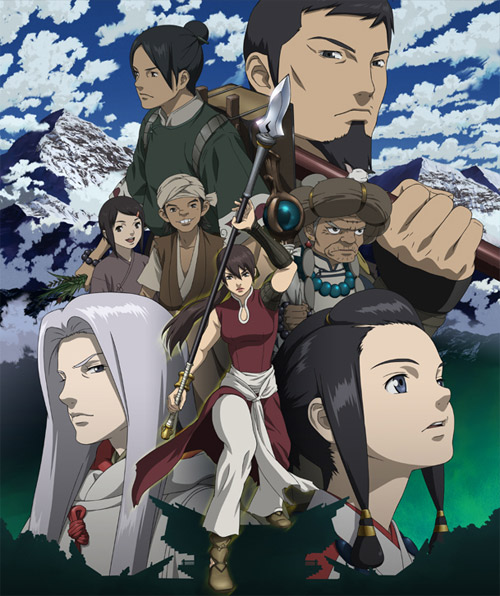
Balsa the spear woman is a wandering warrior who is saving the lives of eight people to atone for her past. During her journey, she foils an attempt to take the life of a young boy, whom she later learns is a prince, Chagum, who is carrying the egg of a water spirit inside of him. Because the royal family believes the egg is the reincarnation of a demon, Chagum's father orders Chagum to be killed for the good of the country; Chagum's mother desperately tasks Balsa with keeping Chagum alive no matter what.
There are three vastly different types of series that come together in Moribito: One is the more action-oriented part of the series, where Balsa battles it out with various characters to protect Chagum and her friends. The second is the more slice-of-life part of the series, where Chagum becomes oriented to life outside the formal universe of the remote mansion where he was born and raised, and where Balsa's group grows to become a tight-knit family. And the third is the political thriller of sorts that develops when saving Chagum suddenly means turning over the entire foundation of the kingdom. It might not seem as if that combination would work, but Moribito's pacing is strong enough to seamlessly blend those disparate elements.
Probably the most immediately apparently strength of Moribito is that it is gorgeous, both in visual design and the fluidity of its animation. This series is easily one of the best-looking TV anime of the past five years. (No surprise at all with Production I.G providing a solid budget to director Kenji Kamiyama.) The fight scenes in particular are just something else, especially since Balsa and everyone else she battles approach each conflict with actual tactics in mind instead of just blindly striking at each other. Watching every battle unfold as every strike smoothly leads into the next is just amazing.
But despite how action-heavy the first five or so episodes of Moribito are, it is not an action-oriented series. It's as much a coming of age story for Chagum as it is anything else. The little kid is a smart guy and is surprisingly fearless, but having little contact with the outside world means he is completely out of touch with those who live in the kingdom he is to inherit. The episodes where Balsa and company teach Chagum the ropes of living among the commoners are some of the slower episodes in the series, but they're still fun to watch nonetheless.
One area where Moribito really shines is in the collective competence of the characters. For anyone who is tired of hordes of dumbass teenagers in anime, Moribito isn't just a breath of fresh air -- it's a damn tornado. There's not a single idiot on either side of the conflict; if someone acts incorrectly, it's usually because he or she just does not have as much information as the other side. People usually make a lot out of Balsa being a strong, smart female lead (which anime needs more of, obviously), but her comrades and enemies are no slouches either. They keep cool, think their actions through and are always practical.
Really, I think that because of this, there are no real villains in Moribito, which makes it all the more amazing that it keeps up as much tension as it does. Those who go against Balsa are not exactly evil people; in fact, many of them want to protect Chagum as much as she does. It's just that their level of information differs, so what they believe is the correct way to protect the prince inevitably differs as well. Aside from that, they are perfectly good, reasonable people. The only person who might be called a villain is Chagum's father, the mikado, but even though the viewer clearly is not supposed to agree with the decision to kill Chagum, the reasons for doing so are, again, somewhat understandable given the amount of available information.
(It's a world of magic, after all, so a demon inhabiting a child's body and using that to wreak havoc on a country would not be completely unheard of.)
Maybe the only thing that intimidated me about Moribito going in is how Japanese it is and how much stuff would fly over my head. But while there are some things that did not make too much sense to me, for the most part the series does a good job of not getting too heavy on the Japanese mythology and whatnot. If an ignorant foreigner like me can make it through without his head spinning, then so can you!
Moribito is a great-looking series with solid characterization and a good plot that is solidly paced and built. You don't find too many series that are as intelligent as this, so definitely give it a shot.
If you like this, then watch ... : Kemono no Souja Erin was one of last year's best series; it was adapted from a novel written by the author of Moribito. A lot of what makes Moribito good also makes Erin a worthy watch. And, of course, there are the other series directed by Kamiyama: the Ghost in the Shell TV series and Eden of the East.